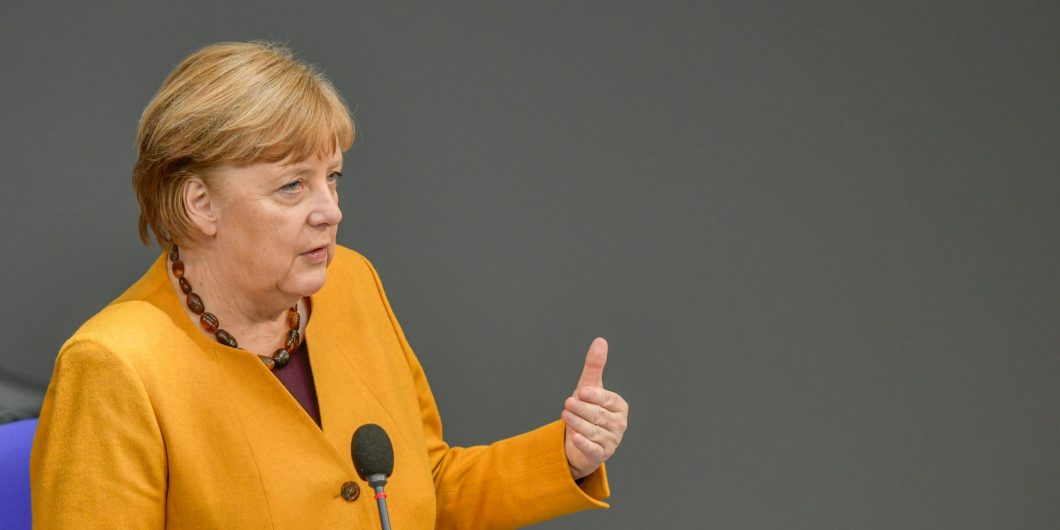St. Angela, Savior of the World
Angela Merkel served as Germany’s Chancellor from 2005 to 2021. During her 16-year reign, she was dubbed “the most powerful woman in the world,” “the all-but-official chancellor of Europe,” and “leader of the Free World.” She has remade Germany and Europe. And there is no doubt that Merkel, her political life, and her vision of statesmanship will be studied closely in the coming decades.
With The Chancellor: The Remarkable Odyssey of Angela Merkel, Kati Marton has shown how not to conduct such a study. Published in the fall of 2021, The Chancellor can hardly be considered an actual biography. Rather, the book falls squarely into the category of hagiography, approaching a secular canonization of Merkel. Progressive thinkers like Marton may be able to celebrate and praise “St. Angela,” but this divorces her account from reality.
The basic premise of the book is that the immaculate Angela Merkel can do no wrong (and certainly has not done wrong). Indeed, Marton argues with full sincerity that Merkel “never lied” in her time as chancellor. Her political career was a journey of promoting openness, toleration, and freedom. She is the great defender of the global liberal regime and her whole life has been a struggle against the forces wishing to destroy it. She has always been engaged in “saving the world.”
Faith, Freedom, and Feminism
Granted, the early chapters of the book on Merkel’s childhood in communist east Germany are by far the most enlightening and insightful of the whole work. Born in Hamburg but her family having moved east early on, Merkel was engaged in her faith—her father being a Lutheran pastor—and immersed in biblical exegesis. She seemed early on to have developed some doubts, especially about institutionalized Christianity. These doubts continued to linger for the rest of her life, as she admitted as a German minister in the nineties: “I am not always clear and sure in my faith. I sometimes have doubts.” Her faith has always remained a private one: “For me, religion belongs in the private sphere.”
As a physics student, Merkel dreamed of freedom and especially of the American kind: “trapped behind the Iron Curtain, she said that her dream was ‘to see the Rocky Mountains and drive around in a car, listening to Bruce Springsteen.’” While she was never an outspoken opponent of the communist regime, she was by no means a supporter of it. She was elated by movements such as Solidarność in Poland. As a spy noted to the regime: “she isn’t a dissident, but she sometimes thinks a little too loudly.”
Marton finds in these early moments the start of Merkel’s lifelong struggle for women’s rights and for individual freedom. As for the former, one of the most consistent elements of Merkel’s grand odyssey was her effort to break through barriers imposed by men, who always “underestimated” her. Thus, Marton considers her a forerunner for women’s empowerment. Strangely enough, Marton simultaneously asserts that all of Merkel’s career has been motivated by the negligence of her father during her upbringing. Since she was “longing for a more present, more approving father” and “never ceased in her attempt to win his full-hearted support,” she developed “her intense drive for achievement” which led her to the chancellorship. Angela the uber-feminist then is supposedly driven primarily by the opinions of a man, which hardly sounds very feminist.
Even more abstruse, however, is Marton’s characterization of Merkel as a great freedom fighter and a “firm believer in the free market.” As Germany’s chancellor, Merkel rarely expanded freedom, but had a strong inclination toward political centralization both in Berlin and Brussels; excessive regulation, taxation, and redistributionism; and the abolition of individual liberties, especially in the final two years of her tenure when she implemented some of the longest-lasting and harshest COVID lockdowns in the world.
Merkel’s Nemeses
And yet, Merkel not only fought for freedom and women’s opportunities, but also repeatedly stood up against the enemies of the liberal progressive order. Every hagiography needs a devil, and Marton’s account has three great nemeses of eternal Merkelian peace: the AfD, Donald Trump, and Vladimir Putin.
Marton’s account of the ascendancy of the “far-right” AfD, especially among Eastern Germans, is telling of today’s worldview amongst many progressives. The party started out as a movement critical of the euro and the bail-out of Greece, a fact ignored by Marton, and slowly evolved into an anti-immigrant party, serving as Merkel’s first great nemesis.
Merkel is presented by Marton as a perennial and staunch defender of minorities. This often takes on ridiculous levels, such as Marton crediting Merkel for the legalization of gay marriage (even though Merkel voted against it) or that Merkel reined in Pope Benedict XVI in his alleged anti-Semitic leanings. Indeed, according to Marton, Pope Benedict XVI reversed his decision to reintegrate the Society of St. Pius X into the Catholic Church after one of their bishops denied the Holocaust, only because Merkel attacked the Pope for not doing so. Remember, everything good that happens is because of Merkel, and without her guidance, even the Pope is apparently incapable of realizing that holocaust denial is bad.
But Marton’s prime example is Merkel’s handling of the refugee crisis. Here in 2015, the chancellor was the only rational soul in Germany, being open and tolerant to refugees. She heroically quashed and battled the bigoted AfD and its predominantly Eastern German base—all of whom are obviously deplorable fascists. Indeed, this was Merkel’s “Martin Luther moment.” Faced against a people opposed to her policy, she stood up and—Marton actually equates Merkel with Luther at Worms—made her stand: “I can do no other, so help me God.” Undoubtedly, many (if not most) of the ideas of the AfD are problematic and worrisome, often and increasingly over the years sliding from justified concerns over mass immigration from a very different culture to actual xenophobia, race baiting, and in some instances even antisemitism. But Marton is completely tone-deaf and ignorant of those early and still existing concerns of rural skeptics of global cosmopolitanism.
Marton’s work is effectively a secular sanctification of Merkel. But it is so at the expense of an accurate portrayal of the 21st century’s most important political figure.
As for Merkel’s second great enemy, President Trump, Marton repeats the same mistake. Regardless of Trump’s general qualities or failures, Marton describes him as a proto-tyrant who did nothing but try to destroy the West’s order. He was thankfully restrained by Angela the Great. Trump’s campaign rallies were similar to “Hitler’s use of mass rallies,” but thankfully, when “democracy was in need of a champion, […] Merkel rose to the occasion.”
Marton’s portrayal of U.S. Presidents is comical overall. President Obama gets a surprisingly rough treatment, only being saved in his major decisions by the wisdom and council of Merkel. President George W. Bush is described as a great cowboy with a warm heart who had much in common with the heroine of the story. President Bill Clinton is called a “good, old boy” who innocently told “ribald anecdotes when in all-male company,” which seems to be a bit of an understatement considering the importance of feminism in Marton’s story.
These are not the only instances in which Marton describes some personalities in obscure and colorful ways. For instance, former German President Joachim Gauck is described, without adding any substance to the story, as “a still-handsome octogenarian who bears an uncanny resemblance to the late American actor James Garner” (judge for yourself). Merkel’s chief female advisor “is blond and slim, with the wholesome good looks of a yoga instructor.” These illustrations certainly make for good laughter and unintended entertainment, but hardly aid in Marton’s account of Merkel.
The most outrageous part of the book comes in the third great enemy, namely in the figure of Vladimir Putin. It is here where Marton probably wishes she had written the book after Russia’s invasion of Ukraine. According to Marton, “in Angela Merkel, Putin knew he had met his match.” She became “a foe” who “would neither shut up nor praise him. Nor could Putin silence her.” Indeed, Merkel was allegedly the one great opponent of Putin throughout the last two decades. “Merkel proved she could stand up to Putin when others would not.”
Of course, in reality, Merkel did not heed the warnings of many critics throughout the years that she was too sympathetic and cooperative to Putin, thus leaving Putin unchecked and feeling all too comfortable and ready for bolder actions. She did not listen to those that cautioned about making Germany too reliant on Russian gas or that warned that not spending on defense could backfire. Marton recognizes Merkel’s pragmatic approach but concludes trustingly: “Merkel no doubt weighed all these factors.” Indeed, thanks to Merkel, “the Russian leader lost Ukraine.”
Beyond this, Marton considers Merkel’s energy policy, closely related to her relationship with Russia, as a great environmental success. In reality, her impulsive decision to abandon nuclear energy and her insistence on finishing Nord Stream 2, thus making Europe more dependent on Russian gas, have been catastrophic for the economy, the environment, and the geopolitical position of the West.
Prudence Without Principles
Disregarding all the praise, Marton’s book does not attempt to solve the essential question about Merkel that is so difficult to answer: what does Merkel even believe in in the first place? What are the political principles she holds? Commentators have always pointed to Merkel’s prudence, “habitual caution,” and humility, with bolder decisions sprinkled in between whenever needed. Marton follows that narrative consistently. And it is true that Merkel has a certain humility in her persona, if not in her decision-making, that is laudable, never having considered herself as the center of the universe.
However, prudence only exists if one has actual principles. Prudence, that great Aristotelian political virtue, does not mean mere cautiousness and going along with the flow of public opinion. It also doesn’t mean making sudden radical decisions that are not conducive to the situation at hand. Rather, a prudent politician holds political beliefs, but his or her prudence dictates how he or she tries to implement them in the concrete situation: sometimes with moderation, sometimes with boldness. Having actual principles and convictions is a necessary prerequisite nevertheless.
Even to this day, after 16 years at the helm of Germany, it is unclear what Angela Merkel actually believes in. Marton concedes so herself: Angela “leaves no Merkel Doctrine.” Rather, her major decisions always were unexpected, erratic, and impulsive, often detrimental to her country and the continent that she was supposedly leading. Whenever she made sudden decisions—such as abandoning nuclear, saving the euro by any means necessary, suspending the Dublin Agreement to welcome refugees (without telling any of her fellow EU leaders), implementing harsh and scientifically dubious lockdowns and closing borders to other countries, regardless of the EU’s freedom of movement—she neither cared for permanent principles, the rule of law, nor for moderation.
Thus, Merkel was not the prudent world leader that Marton makes her out to be. Rather, Merkel’s reign is defined by her imprudence and disorientation, leading without a thread, and becoming a cautious example of “cautiousness” gone wrong. Hopefully, as the repercussions of Merkelism slowly manifest themselves, a reevaluation will occur. If it will, it won’t be found in The Chancellor. Marton’s work is effectively a secular sanctification of Merkel. But it is so at the expense of an accurate portrayal of the 21st century’s most important political figure.


